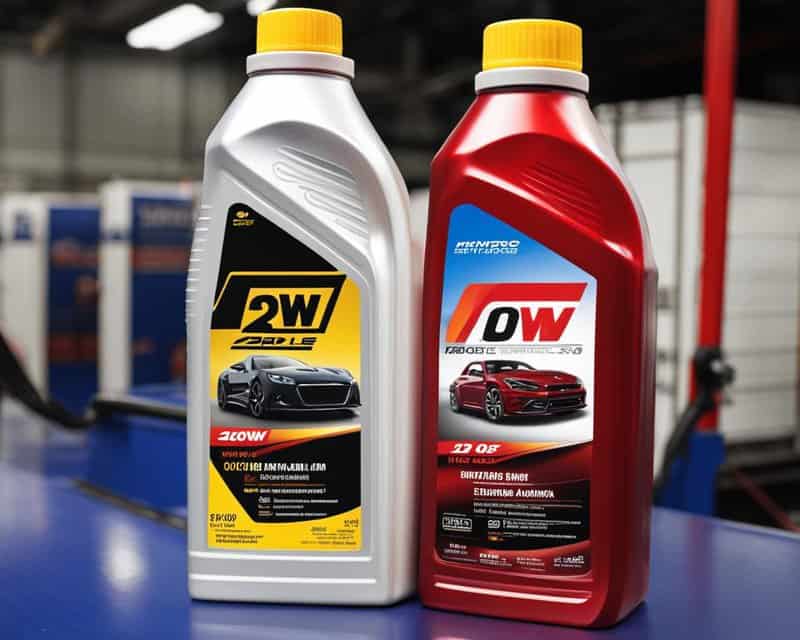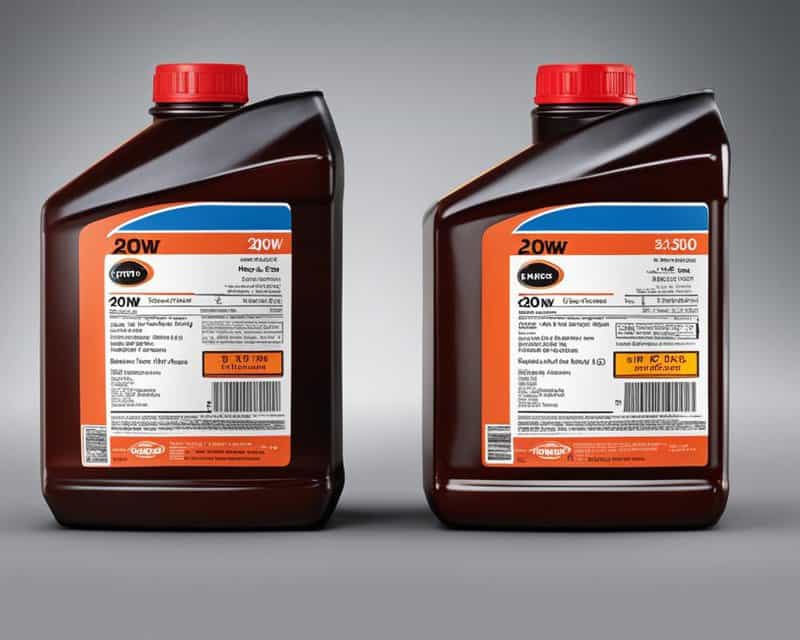When it comes to choosing the right engine oil for your vehicle, understanding the key differences between 20w40 vs 20w50 motor oils can help you make an informed decision, ensuring proper lubrication and engine performance. The viscosity of motor oil, represented by its viscosity grade, plays a crucial role in engine oil performance and protection, affecting both engine oil life and engine components. In this article, we will delve into the nuances of 20w40 and 20w50 motor oil, exploring their viscosity ratings, differences, and factors to consider when selecting the best oil for your car.
Key Takeaways:
- Viscosity ratings, like 20w40 and 20w50, indicate the oil’s performance at different temperatures.
- 20w40, with its lower viscosity when heated, is better suited for low temperatures, making it an ideal choice for colder climates and ensuring engine’s smooth performance.
- 20w50, with its higher viscosity when heated, is ideal for hot climates and heavy-duty vehicles, offering enhanced engine protection at high temperatures.
- Operating temperatures, climate, and vehicle type, including modern engines and older vehicles, play a crucial role in determining the most suitable engine oil grades for motor oil.
- Always refer to your vehicle manufacturer’s recommendations and consider synthetic motor oil or brand-specific oils for enhanced engine performance and engine oil life.
Viscosity Ratings and Motor Oil Grades
Motor oil viscosity plays a crucial role in determining the oil’s ability to flow and protect an engine under different temperature conditions. Viscosity is indicated by a set of numbers, such as 20w40 or 20w50. The first number reflects the oil’s viscosity at low temperatures, while the second number represents viscosity at high temperatures.
The “w” in the viscosity rating stands for winter, indicating the oil’s performance in colder temperatures. The subsequent numbers reflect the oil’s viscosity during warmer temperatures. For example, a multi-grade oil like 20w40 or 20w50 offers a broader range of viscosity to cater to both cold and hot environments.
In contrast, single-grade oils such as 20w or 40w have a fixed viscosity and are better suited for consistent temperature conditions. They perform well in environments where the temperature remains relatively stable.

Differences Between 20w40 and 20w50
The primary difference between 20w40 and 20w50 motor oil lies in their viscosity at high temperatures. When comparing 20w40 vs 20w50 motor oil, it’s essential to consider their impact on engine performance, temperature range, and lubrication properties.
20w40 oil, a muti viscosity oil, has a lower viscosity when heated, providing better lubrication in colder climates and for older vehicles. It flows more easily in low temperatures, ensuring optimal engine performance even in chilly conditions. This grade of motor oil is suitable for vehicles operating in regions with colder climates or during winter months.
On the other hand,20w50 motor oil, known for its high temperatures resilience, has a higher viscosity when heated, making it more suitable for hotter climates and heavy-duty use, or vehicles that operate under heavy loads. It maintains its viscosity and lubrication properties even in extreme heat, offering excellent engine protection in high-temperature conditions. This grade of motor oil is commonly used in hotter climates or for vehicles that experience elevated engine temperatures, such as high-performance cars or trucks carrying heavy loads.
It’s important to note that the specific needs of your vehicle’s engine and the manufacturer’s recommendations should always be taken into consideration when choosing between the two grades. Consulting your vehicle’s owner’s manual or seeking advice from a professional mechanic can help you make an informed decision that optimizes engine performance and longevity.
“Choosing the right engine oil viscosity, such as 20w40 vs 20w50, is crucial for maintaining optimal engine performance and protection and minimizing wear and tear. Understanding the differences between 20w40 and 20w50 motor oil can help you make an informed decision based on your vehicle’s specific needs.”

When comparing 20w40 vs 20w50 motor oil, it’s important to consider the temperature range in which your vehicle operates, as well as its lubrication requirements. By selecting the appropriate motor oil grade, you can enhance engine performance, protect against excessive wear, and ensure optimal lubrication properties.
Considerations for Climate and Vehicle Type
The choice between 20w40 and 20w50 motor oil often depends on the climate in which your vehicle operates. In colder climates, where temperatures can drop significantly, 20w40 oil is generally recommended as it flows more easily in low temperatures. On the other hand, 20w50 motor oil is commonly used in hotter climates or in vehicles that generate higher engine temperatures, such as air-cooled motorcycles.
When exposed to temperature extremes, the viscosity of motor oil plays a crucial role in maintaining proper engine lubrication. In low temperatures, thicker oil like 20w40 ensures better lubrication and protection during cold start, crucial for an engine’s smooth performance, preventing engine wear in low temperatures. In contrast, 20w50 oil has a higher viscosity and offers improved lubrication and engine protection under hot conditions.
Air-cooled motorcycles, facing high temperatures, often require 20w50 motor oil for optimal performance and engine protection to maintain maximum performance over time. The increased viscosity of 20w50 oil can handle the temperature extremes that air-cooled engines generate, ensuring adequate lubrication and preventing overheating.
It’s important to consider both the climate suitability and the specific requirements of your vehicle type when selecting the appropriate motor oil viscosity. Consulting your vehicle’s owner manual or seeking advice from a professional can provide further guidance in choosing the right motor oil for your specific needs.
Impact on Engine Performance
Choosing the right motor oil viscosity, whether it’s 20w40 or 20w50, can have a significant impact on your vehicle’s engine performance. The viscosity of the oil affects how well it flows and lubricates the engine’s moving parts.
Optimal engine lubrication is crucial for reducing wear and tear, ensuring proper sealing, and maximizing fuel efficiency. When the motor oil has the correct viscosity, it forms a protective layer that prevents metal-on-metal contact, reducing friction and minimizing engine wear.
The use of a motor oil with the appropriate viscosity grade can also improve engine performance and fuel efficiency, leading to better fuel economy over the long run. A well-lubricated engine operates more smoothly, minimizing energy losses due to friction and maximizing power delivery. This can result in improved gas mileage and reduced fuel consumption.
Furthermore, selecting the right motor oil viscosity can help minimize oil consumption. If the oil is too thin, it may not provide sufficient lubrication, leading to increased oil consumption as the engine burns through the oil more quickly. On the other hand, if the oil is too thick, it can create excessive resistance, leading to oil foaming and increased oil consumption.

In order to maintain engine efficiency, fuel economy, and minimize wear and tear and oil consumption, it’s crucial to choose a motor oil viscosity that aligns with your vehicle’s requirements and the manufacturer’s recommendations.
Manufacturer Recommendations and Warranty Considerations
When it comes to choosing between 20w40 and 20w50 motor oil, it’s crucial to follow your vehicle’s manufacturer recommendations. These recommendations are based on extensive testing and are designed to ensure that the motor oil you use is suitable for your engine’s specific design and operating conditions. By using the recommended motor oil, you can optimize engine performance and protect your investment.
Following the manufacturer recommendations is not only important for engine performance but also for warranty coverage. Deviating from the recommended motor oil can potentially void your warranty, leaving you responsible for any repair costs that may arise due to using an unsuitable product.
Consulting your vehicle’s owner’s manual is the best way to determine the recommended oil by the manufacturer for your engine. The manual will provide detailed information on the appropriate viscosity grade, such as 20w40 or 20w50, and any specific requirements or certifications that the motor oil should meet.
By using the recommended motor oil, you can have peace of mind knowing that your engine is being properly protected and that any potential warranty claims will be supported by the manufacturer.
“Using the recommended motor oil is crucial for maintaining engine performance and protecting your warranty. Always refer to your vehicle’s owner’s manual for specific manufacturer recommendations.”
The Role of Synthetic and Brand-Specific Oils
In addition to viscosity differences, motor oils can also vary in their composition. Synthetic and brand-specific oils, for example, offer enhanced performance and improved engine protection over other oils, suitable for both cars and bikes. These oils are specifically designed using advanced synthetic base oils and additive technology, which provide better lubrication, cleaner engines, and extended engine life.
When it comes to selecting the right motor oil for your vehicle, you may also come across brand-specific oils. These are oils that are formulated by certain brands to cater to specific vehicles or engine types. For instance, some brands offer specialized oil formulations for high-performance engines, V-Twin motorcycles, or specific makes and models. These brand-specific oils often contain additives that are tailored to provide specific benefits, such as increased lubrication, reduced engine wear, or improved fuel efficiency.
One of the key advantages of synthetic motor oil is its ability to withstand high temperatures and extreme conditions. Synthetic motor oils have better resistance to breakdown, oxidation, and thermal stability, making them suitable for engines in hot climates, making them an ideal choice for engines that operate under heavy loads or in extreme temperatures.
Extended engine protection is another benefit offered by synthetic motor oils. The synthetic base oils used in these oils have uniform molecular structures, which allow them to provide better lubrication and reduce friction between moving parts. This not only helps in minimizing wear and tear on the engine but also helps in maintaining engine performance and efficiency over a longer period of time. Additionally, some synthetic motor oils contain specially formulated additives that provide extra protection against engine deposits, sludge, and corrosion.
However, it’s important to note that not all engines may require synthetic or brand-specific oils. Always refer to your vehicle’s owner’s manual or consult with a professional to determine the best motor oil for your specific engine. It’s also worth considering any warranty or maintenance requirements set by your vehicle’s manufacturer, as deviating from their recommendations may void your warranty coverage.
Regular Maintenance and Oil Change Intervals
Regular oil change intervals are crucial for maintaining the health of your engine, engine system, and internal parts, regardless of whether you choose 20w40 or 20w50 motor oil. By following your vehicle’s recommended maintenance schedule and adhering to proper oil change intervals, you can ensure that your engine remains adequately lubricated for optimal performance.
Monitoring oil levels and quality on a regular basis is also essential. This allows you to identify any potential issues, such as leaks or contamination, before they become more significant problems. By staying vigilant and proactive in your oil maintenance, you can prolong the life of your engine and prevent costly repairs.
Remember, each vehicle has its own unique maintenance requirements, so it’s important to consult your owner’s manual or speak with a professional to determine the ideal oil change interval for your specific make and model.
“Regular oil changes and proper maintenance are key to ensuring engine longevity and performance, regardless of the viscosity grade you select.”
Conclusion
After comparing 20w40 and 20w50 motor oil, it’s clear that choosing the right viscosity grade depends on various factors such as climate, vehicle type, and manufacturer recommendations. Both 20w40 and 20w50 provide adequate lubrication for most engines, offering engine protection against wear and tear.
When deciding between the two grades, consider the climate in which your vehicle operates. 20w40 is more suitable for colder climates, as it flows better at low temperatures, while 20w50 is recommended for hotter climates or vehicles that generate higher engine temperatures.
It’s important to consult with a professional if you’re unsure which motor oil to choose. They can provide expert advice based on the specific needs of your vehicle and its operating conditions. Regular oil changes and proper maintenance are essential for engine longevity and performance, regardless of the viscosity grade you select.
FAQ
What do the numbers in 20w40 and 20w50 motor oil mean?
The numbers indicate the oil’s viscosity at different temperatures. The first number represents viscosity at low temperatures, while the second number represents viscosity at high temperatures.
What is the difference between multi-grade and single-grade motor oils?
Multi-grade oils, like 20w40 and 20w50, offer a wider range of viscosity and perform well in both cold and hot environments. Single-grade oils, like 20w or 40w, have a fixed viscosity and are better suited for consistent temperature conditions.
How do 20w40 and 20w50 motor oil differ?
The primary difference lies in their viscosity at high temperatures. 20w40 oil has a lower viscosity when heated, making it better for colder climates. 20w50 oil has a higher viscosity when heated, making it suitable for hotter environments or vehicles under heavy loads.
Which motor oil grade is better for colder climates?
20w40 oil is generally recommended for colder climates as it flows more easily in low temperatures.
Which motor oil grade is better for hotter climates or high-temperature engines?
20w50 motor oil is commonly used in hotter climates or vehicles that generate higher engine temperatures, such as air-cooled motorcycles.
How does motor oil viscosity affect engine performance?
Optimal engine lubrication is crucial for reducing wear and tear, ensuring proper sealing, and maximizing fuel efficiency. The viscosity of the oil affects how well it flows and lubricates the engine’s moving parts.
Should I follow my vehicle’s manufacturer recommendations for motor oil?
Yes, it is important to consult your vehicle’s manufacturer recommendations to ensure that the motor oil used is suitable for your engine’s design and operating conditions. Deviating from the recommended motor oil may void your warranty or lead to undesirable engine performance issues.
Are there different types of motor oil compositions?
Yes, synthetic motor oils offer enhanced performance and improved engine protection over conventional oils. Some brands also offer specific oils formulated for certain vehicles or engine types, which may contain additives tailored to provide specific benefits.
How often should I change my motor oil?
Regular oil changes are essential for maintaining engine health. Follow your vehicle’s recommended maintenance schedule and adhere to proper oil change intervals.
Which motor oil grade should I choose?
The choice depends on various factors such as climate, vehicle type, and manufacturer recommendations. Consider the specific needs of your vehicle and consult with a professional if you’re unsure which motor oil to choose.
